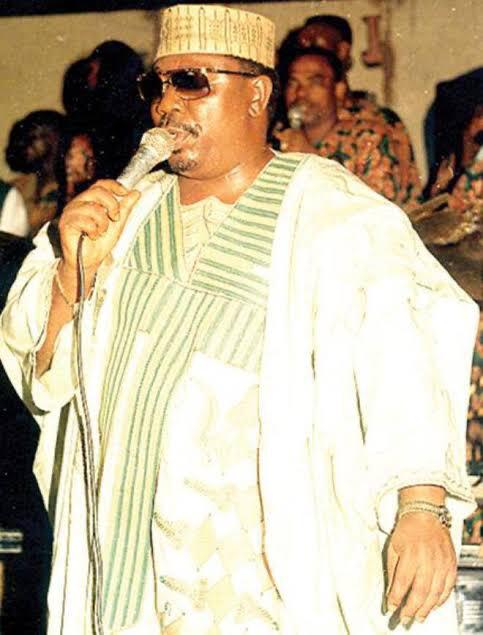Fuji Music is a genre popular in the Yoruba land. It is a derivative of Were Music, a type of music developed by Islamic singers and is sung during Ramadan to wake Muslims up before the break of the day during the fasting period.
The popularity of Were grew with the influence of the Late Sikiru Ayinde Barrister who also conceived the name “Fuji” for the newly developed genre. Waka was the female version of Wéré.
WÉRÉ ERA
As stated earlier, Fuji was an offspring of Wéré that was developed by Islamic singers to wake Muslims up during Ramadan period. In the the 50s, Alhaji Dauda Epo-Akara and Ganiyu Kuti (Gani Irefin) were the pioneers of Wéré in Ibadan. From the 50s towards the 60s, several groups were formed in different cities across the Western Region (South-Western Nigeria). Amongst the early popular Wéré groups was Jibowu Barrister which had the late Sikiru Ayinde Barrister as its lead singer and composer. Some other Wéré singers were Ayinde Fatayi, Kasali Alani, Saka Olayigbade, Ayinla Yekinni, and Bashiru Abinuwaye.
THE BIRTH OF FUJI MUSIC
Fuji Music was groomed, rebranded and popularised by Sikiru Ayinde Barrister, he named the genre Fuji after he saw a poster advertising Japan’s Mount Fuji. At the early stages, Fuji was not accepted with open arms, no thanks to the belief that it was hooligan and local music. The late Sikiru Ayinde Barrister took it upon himself to debunk the narrative that Fuji Music is a local genre. He did so by taking it outside the shores of Africa with a tour in England in the 70s, then a tour in the United States of America in the 80s, both of which were big accomplishment at the time considering how under appreciated Fuji was in Nigeria and how his contemporaries had a tough time trying to make their big break. Barrister, as he was popularly known, laid the path for Fuji artistes and developed his own style of Fuji – Fuji Garbage. Between the 70s and 80s, other Fuji artistes like Love Azeez, Fatai Adio, Saura Alhaji, Student Fuji, Rahimi Ayinde (Bokote) etc, came on the scene to introduce new blends of Fuji music. The 70s also marked the emergence of Alhaji Kolington Ayinla as a big star and as Barrister’s rival.
GROWTH OF FUJI IN THE 90s
In the early 90s, a student of Sikiru Ayinde Barrister, Wasiu Ayinde (K1 de Ultimate) became a master of the genre and introduced his own style of Fuji – Talazo Fuji – that appealed to the Youths.
Adewale Ayuba also blew in the 90s with Bonsue Fuji, a style that also appealled to the younger generation. With inspiration from K1 de Ultimate, Pasuma also arrived on the Fuji scene with his own unique style. Abass Akande Obesere burst onto the Fuji scene and introduced a “street style” of Fuji music which included the abundant use of vulgar words.
Fuji in the 90s was highly dominated by the youths that took the baton from ageing men that introduced the genre. The difference between the Fuji of the 60s-80s and the Fuji of the 90s was the modernisation of Fuji to give it a youthful feel and it worked perfectly as it drew a lot of youths to Fuji music.
FUJI IN THE 2000s
Years after bursting onto the scene, K1 de Ultimate, Pasuma, Saheed Osupa, Alao Malika, Muri Thunder and Remi Aluko maintain their dominance and relevance in the Fuji scene. The likes of Taye Currency and Alao Malaika have also represented very well, inspiring and nuturing the future generation.
Some of the newer Fuji artistes that have managed to make wave include Shanko Rasheed, Wasiu Container, Muri Ikoko and the likes.
Wasiu Ayinde (K1 de Ultimate) still remains the most popular Fuji artiste amongst all active Fuji artiste.
INFLUENCE OF FUJI ON THE NIGERIAN POP CULTURE
Since its inception on the 60s, Fuji music has continued to grow bigger and better. It has grown from hooligan music to music that is being enjoyed all over the world. Fuji music has continued to influence the Nigerian Pop Culture through its slangs and sometimes hooks and even inspiring some of the biggest Afrobeats songs in Nigeria.
FUJI X HIP-HOP/POP COLLABO
Since the first collaboration between Remedies and Pasuma (the first Fuji and Hip-Hop collaboration in Nigeria), we have been blessed with several collaborations between Fuji and Pop/Hip-Hop artistes. Some of the collabos we have had over the years:
– Remedies feat. Pasuma – Jealousy
– Jazzman Olofin feat. Adewale Ayuba – Raise the Roof
– Dammy Krane feat. Pasuma – Ligali
– Pasuma feat. Tiwa Savage – Ife
– Qdot feat Pasuma- Gbeja
– Wasiu Ayinde feat Olamide – State of the Nation
– 9ice feat. Pasuma – Ati Je Lo
Some mainstream hit songs were also inspired by Fuji music, some of them are:
– Reminisce – Fantasi
– Olamide – Anifowose
– Dammy Krane – Gratitude
– Odunsi – Fuji 5K
– Reminisce – Kako Bi Chicken
Since the inception of Fuji through Wéré, the genre has been through a lot of phases of growth and evolution, most notably going from being viewed as local music to being recognised on the international level. The cultural influence of Fuji cannot be denied hence the need for the recognition of Fuji music at major Nigerian Award events, similar to how Folk and Country music are recognised by the Grammys. Creating a category for Fuji music at major Nigerian Award shows would take Fuji music to the next level, as it will encourage a lot of younger artistes and become the last part of the puzzle that makes Fuji a mainstream genre in Nigeria.

